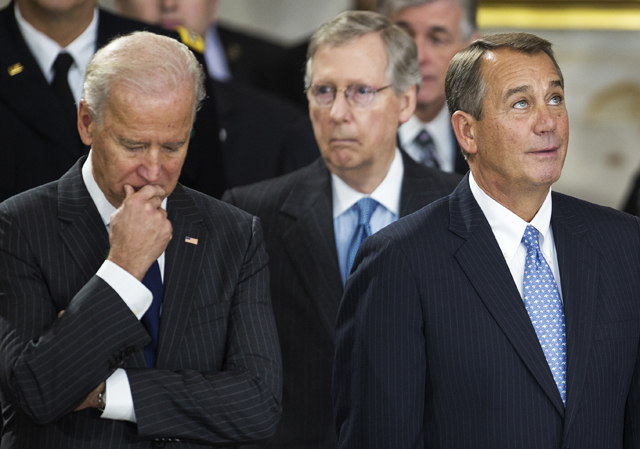Credit: Paul J. Richards/AFP/Getty Images/Newscom
The Congressional Budget Office (CBO) just now released its score of the bill the Senate passed early this morning while everyone was celebrating the beginning of the New Year. Despite knowing for a long time that taxes would go up on all Americans today, the Senate waited until we technically went over the cliff to act. Washington’s dysfunction was even fodder for New Year’s revelers in Times Square.
Going over the cliff allows Congress to technically say that it isn’t raising taxes, but is cutting them instead. CBO’s score backs them up on this by scoring the Senate bill as a $3.6 trillion tax cut. No one should fall for this. The Senate bill is a tax hike because it allows taxes to go up from 2012 to 2013. The tax increases in the bill will reportedly raise about $600 billion over the next 10 years.
Also of note in the CBO score is that the Senate bill increases spending by around $330 billion by extending expanded unemployment benefits, a temporary “doc fix” patch to prevent cuts to Medicare, and extension of the agriculture programs.
There was some good in the Senate bill — the harmful defense sequester cuts were postponed and most tax hikes were avoided. But there was bad — tax hikes that will hurt the economy and do little to tame the deficit, especially factoring in the spending in the bill.
Now the deal that passed the Senate is in the hands of the House of Representatives.
Unfortunately for the economy, the deal struck in the Senate did not stop the entire “Taxmageddon” portion of the fiscal cliff. If the bill becomes law, the top tax rate, the rate paid by small businesses and investors — America’s job creators — would rise from 35 percent in 2012 to 39.6 percent this year for incomes of more than $450,000 for married filers and $400,000 for single filers.
True, this is better than President Obama’s initial demand for rate hikes for those earning more than $250,000. But it would still hurt job creation because it is the small businesses that employ the most workers who will pay the higher rates the Senate’s deal calls for. The accounting firm Ernst Young found that Obama’s plan to raise rates above the $250,000 threshold would cost the economy more than 700,000 jobs. Raising the income threshold to $450,000 won’t do much to lessen the job losses.
Worse for the economy and jobs, the Senate bill increases the tax bias against investment by raising the tax rate on capital gains and dividends for taxpayers with incomes above $450,000 from 15 percent in 2012 to 23.8 percent this year (this includes the new 3.8 percent Obamacare surtax that began today). It also raises the death tax rate from 35 percent in 2012 to 40 percent in 2013. A tiny consolation for families is that the exemption will remain above $5 million and be indexed for inflation.
These tax hikes on investment will further dampen investment and result in even less job creation. This is more bad news for the 12 million unemployed Americans.
Those are the biggest job killers in the Senate bill, but it also contained other troubling provisions. One of which is a return of the phase out of personal exemptions and itemized deductions for high-income taxpayers. These poorly designed policies will raise marginal effective tax rates which will further exacerbate the economic pain caused by the explicit hike in rates.
It will take time to go thru the 157-page bill to truly understand what was in it. Obviously the Senate didn’t do so. Lawmakers voted without a score of the bill from the Congressional Budget Office. The House at least should know what the details are before committing to the same folly.
Source material can be found at this site.










